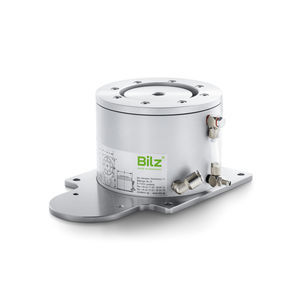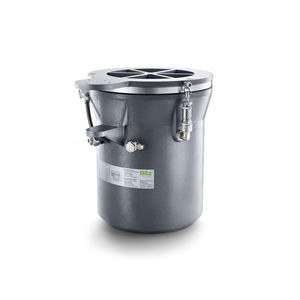
- Materials - Tools - Components
- Standard Mechanical Component
- Compression spring
- Bilz Vibration Technology AG
Compression spring FAEBI® 75 airstainless steelrubber
Add to favorites
Compare this product
Characteristics
- Function
- compression
- Type
- air
- Material
- stainless steel, steel, rubber
- Applications
- transmission, flexible, machine, air conditioning
- Other characteristics
- technical
- Outer diameter
100 mm
(3.9 in)- Internal diameter
43 mm
(1.69 in)- Force
Min.: 400 N
Max.: 1,500 N
Description
The FAEBI® element in VA version were specifically developed for outside applications. Effortless vibration isolation of systems in the open air such as air conditioning units, compressors, heat exchangers, cold water chillers.
Advantages compared to steel springs
In comparison to steel springs the use of air spring offers many advantages when used for vibration insulation:
Flexible insulation system design: Changes in the static or dynamic loads can be compensated for by adjusting the air pressure. This can be performed either manually or pneumatically (e.g. using Bilz level control)
Integrated damping, therefore separate damping is not necessary.
No transmission of structure borne noise
TECHNICAL DATA AND VARIANTS
Variant selection
Please select a suitable rubber air spring so that the maximum load (sum of static and dynamic load) is not exceeded.
Hard FAEBI® variants reduce the deflection of the isolators in applications with high dynamics. The softer the isolator, however, the better the achievable isolating effect.
Please get in touch, we would be happy to assist you in selecting the most suitable elements.
Notes on FAEBI® stainless steel variants
If the bottom edge of the machine does not completely cover the diameter (∅ D) of the rubber air spring, we recommend the use of our special cover (see “Accessories” section for the individual air spring types).
Permissible temperature range: -20 °C to +60 °C
The elements are attached to the holes provided on the machine using the bolts supplied. Anchoring to the floor is usually not necessary.
Please bolt in by hand only, do not use a wrench! Please also fasten the corresponding nut with low torque only.
Catalogs
No catalogs are available for this product.
See all of Bilz Vibration Technology AG‘s catalogsOther Bilz Vibration Technology AG products
AIR SPRINGS (RUBBER AIR SPRINGS/MEMBRANE AIR SPRINGS)
Related Searches
*Prices are pre-tax. They exclude delivery charges and customs duties and do not include additional charges for installation or activation options. Prices are indicative only and may vary by country, with changes to the cost of raw materials and exchange rates.







